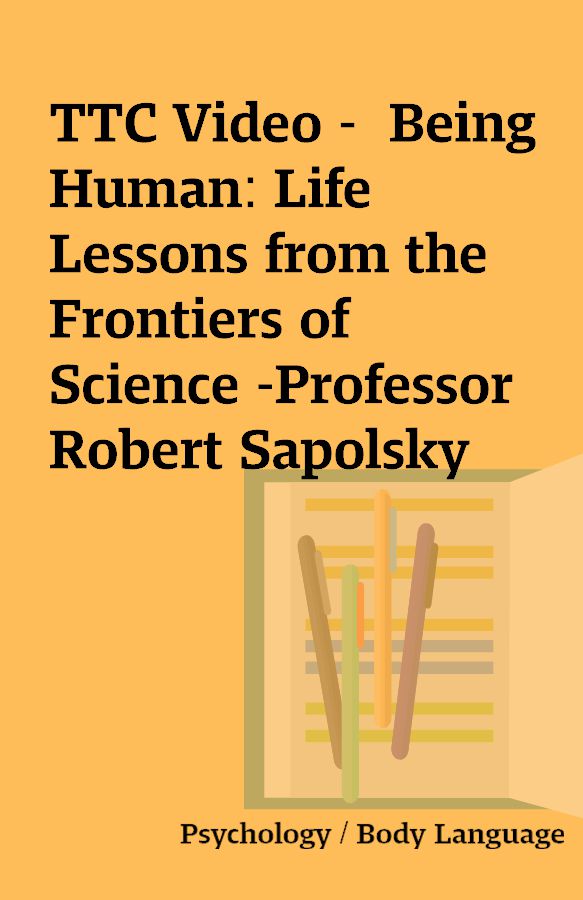TTC Video – Being Human: Life Lessons from the Frontiers of Science -Professor Robert Sapolsky
TTC Video – Being Human
[12 MP4]
Description
elib.tech Exclusive… sharing elsewhere will result in being banned!Being Human: Life Lessons from the Frontiers of Science Taught By Professor Robert Sapolsky, Ph.D., Rockefeller University,Stanford UniversityUnderstanding our humanity—the very essence of who we are and how we live our lives—is one of the deepest mysteries and biggest challenges in modern science.Why do we have bad moods? Why are we capable of having such strange and vivid dreams? How can metaphors and symbols in our language hold such a powerful sway on our thoughts and actions?As we learn more about the mechanisms of human behavior through evolutionary biology, neuroscience, anthropology, psychology, sociology, and other related fields, we’re discovering just how intriguing the human species is. And while scientists are continually uncovering deep similarities between our behavior and that of other animals, they’re also finding a wealth of insights into everything that makes us unique from any other species on Earth.Join acclaimed neurobiologist and award-winning Professor Robert Sapolsky of Stanford University for a surprising, amusing, and undeniably fascinating study of what makes you you. Being Human: Life Lessons from the Frontiers of Science is a 12-lecture course that takes you to the front lines of scientific research and offers you a new perspective on the supposedly quirky nature of being ourselves. Thought-provoking, witty, and sometimes myth-shattering, this course is sure to have you thinking about, observing, and even appreciating your own life in novel ways.Explore Mysterious, Everyday Human Behaviors”The more science learns about the mechanisms of human behavior, the more intriguing our species becomes,” notes Dr. Sapolsky, a renowned neuroscientist and primatologist. Whether we’re falling in love, performing a spiritual ritual, or enjoying poetry and fashion, our brains have a unique aptitude for handling complex patterns of experience and conduct. And when it comes to our behavior, it is the nature of humans to be remarkably unconstrained by our nature.Being Human explores this intrigue by investigating a series of topics that concern both mysterious and sometimes even mundane aspects of human behavior.Bad moods: We’ve all gotten into an argument with another person at some point in our lives, one that can completely ruin our outlook on the day. But when you pause and consider the anatomy of a bad mood from a scientific perspective, you find that different parts of the brain actually recover from conflict at different speeds—and as a result, just when you thought it was over with, the argument starts all over again.Nostalgia: Why do we sometimes long for the fashions, foods, and music of our youths? Why are we sometimes resistant to change after we reach a certain point in our lives? The answers lie in research findings in psychology and neurobiology, which have revealed new information about our desire for stability and habitual behaviors.Dreams: Scientists are now closer than ever before to understanding just why our dreams can sometimes be extremely bizarre. The key lies in the frontal cortex of the brain that, during dreaming, decreases its activity and opens the gates for dreamlike imagery that seems so unconnected to our everyday experiences.Bold Experiments, Fascinating Case StudiesCentral to our increased understanding of human behavior is the intriguing research behind it. Being Human is filled with stories of bold experiments and case studies—some of them conducted in the field by Professor Sapolsky himself—that illuminate the intricacies of our behavior.Junk-food monkeys: Professor Sapolsky recounts his study of East African baboons that turned from their natural diet in favor of trash from a nearby tourist lodge. Their experience with a Western diet highlights how its negative effects (such as soaring levels of insulin) and positive effects (such as decreased infant mortality) can cross species.Mind-controlling parasites: Central to our understanding of how parasites can change human behavior is the study of similar parasites in other parts of the natural world. You’ll encounter one extraordinary parasite that makes rats become attracted to the smell of cats. What does this say about our own brain’s susceptibility to foreign influences?Replacing love with technology: Is new technology necessarily better for healthy development? To answer this question, you’ll investigate one historical case in which the health of premature children, born into wealthy families, suffered because they were raised using a state-of-the-art machine instead of with the love and care of a mother.Rethink What It Means to Be HumanIn addition to these and other experiments and studies, every lecture of Being Human showcases the brilliant mind and celebrated teaching style that have made Professor Sapolsky one of the most acclaimed members of The Great Courses faculty. He has also been the recipient of numerous awards and honors, including a MacArthur “genius” fellowship, Stanford University’s Bing Award for Teaching Excellence, and an award for outstanding teaching from the Associated Students of Stanford University.As we learn more about the evolutionary and physiological roots of humans, we eventually have to ask ourselves: Am I just another primate? Is “me” just a bunch of brain cells?”Much of what you’ll learn in Being Human will be surprising,” says Professor Sapolsky. “Some of it will be amusing. But I’m sure every lecture will have you rethinking what it means to be human.”Course Lecture Titles12 Lectures 30 minutes / lecture 1. What’s So Special about Being Human?2. Junk-Food Monkeys3. The Burden of Being Burden-Free4. Bugs in the Brain5. Poverty’s Remains6. Why Are Dreams Dreamlike?7. The Pleasures and Pains of “Maybe”8. How the Other Half Heals9. Why We Want the Bodies Back10. Anatomy of a Bad Mood 11. This Is Your Brain on metaphors12. Sushi and Middle Ageenjoy!
You must be logged in to post a review.






Reviews
There are no reviews yet.